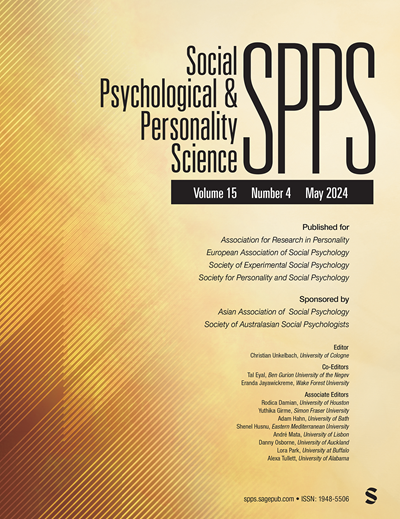白人身份认同的多重威胁及其对白人游击队的政治影响
IF 3.3
2区 心理学
Q1 PSYCHOLOGY, SOCIAL
引用次数: 0
摘要
我们调查了白人民主党人和共和党人对白人身份的威胁是如何运作的。我们评估了先前工作未充分探讨的四种身份威胁:独特性威胁(失去独特的内群体属性)、权力威胁(感知外群体勾结)、道德威胁(质疑内群体的完整性)和精英威胁(质疑内群体的优势)。我们指出哪些威胁在特定的党派中催化了白人的身份认同,并带来了什么样的政治后果。利用预先注册的2000名白人民主党人和2000名白人共和党人的实验,我们发现大多数身份威胁在所有党派中以相当的强度显著催化了白人身份(d = .20)。然而,在白人民主党人中,与白人共和党人相比,种族认同感的增强会导致对亲外群体政策(例如,获得移民公民身份的途径)的更多下游反对,以及对亲内群体政策(例如,传统大学录取)的更多支持。这些间接影响非常强大,并强调了白人身份作为当代党派政治背后的关键机制的可行性。本文章由计算机程序翻译,如有差异,请以英文原文为准。
Manifold Threats to White Identity and Their Political Effects on White Partisans
We investigate how threats to White identity operate among White Democrats and Republicans. We evaluate four identity threats that prior work has underexplored: distinctiveness threat (loss of unique ingroup attributes), power threat (perceiving outgroup collusion), morality threat (impugning an ingroup’s integrity), and meritocratic threat (questioning an ingroup’s advantages). We pinpoint which threats catalyze White identity among specific partisans—and with what political consequences. Leveraging a pre-registered experiment with 2,000 White Democrats and 2,000 White Republicans, we find most identity threats significantly catalyze White identity among all partisans at comparable intensity ( d = .20). However, among White Democrats, a heightened sense of racial identity generates more downstream opposition to pro-outgroup policies (e.g., pathway to immigrant citizenship) and greater support for pro-ingroup policies (i.e., legacy college admissions) than among White Republicans. These indirect effects are highly robust and underscore White identity’s viability as a key mechanism behind contemporary partisan politics.
求助全文
通过发布文献求助,成功后即可免费获取论文全文。
去求助
来源期刊

Social Psychological and Personality Science
PSYCHOLOGY, SOCIAL-
CiteScore
12.50
自引率
1.80%
发文量
77
期刊介绍:
Social Psychological and Personality Science (SPPS) is a distinctive journal in the fields of social and personality psychology that focuses on publishing brief empirical study reports, typically limited to 5000 words. The journal's mission is to disseminate research that significantly contributes to the advancement of social psychological and personality science. It welcomes submissions that introduce new theories, present empirical data, propose innovative methods, or offer a combination of these elements. SPPS also places a high value on replication studies, giving them serious consideration regardless of whether they confirm or challenge the original findings, with a particular emphasis on replications of studies initially published in SPPS. The journal is committed to a rapid review and publication process, ensuring that research can swiftly enter the scientific discourse and become an integral part of ongoing academic conversations.
 求助内容:
求助内容: 应助结果提醒方式:
应助结果提醒方式:


